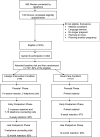A pregnancy and postpartum lifestyle intervention in women with gestational diabetes mellitus reduces diabetes risk factors: a feasibility randomized control trial
- PMID: 21540430
- PMCID: PMC3120183
- DOI: 10.2337/dc10-2221
A pregnancy and postpartum lifestyle intervention in women with gestational diabetes mellitus reduces diabetes risk factors: a feasibility randomized control trial
Abstract
Objective: To pilot, among women with gestational diabetes mellitus (GDM), the feasibility of a prenatal/postpartum intervention to modify diet and physical activity similar to the Diabetes Prevention Program. The intervention was delivered by telephone, and support for breastfeeding was addressed.
Research design and methods: The goal was to help women return to their prepregnancy weight, if it was normal, or achieve a 5% reduction from prepregnancy weight if overweight. Eligible participants were identified shortly after a GDM diagnosis; 83.8% consented to be randomly assigned to intervention or usual medical care (96 and 101 women, respectively). The retention was 85.2% at 12 months postpartum.
Results: The proportion of women who reached the postpartum weight goal was higher, although not statistically significant, in the intervention condition than among usual care (37.5 vs. 21.4%, absolute difference 16.1%, P=0.07). The intervention was more effective among women who did not exceed the recommended gestational weight gain (difference in the proportion of women meeting the weight goals: 22.5%, P=0.04). The intervention condition decreased dietary fat intake more than the usual care (condition difference in the mean change in percent of calories from fat: -3.6%, P=0.002) and increased breastfeeding, although not significantly (condition difference in proportion: 15.0%, P=0.09). No differences in postpartum physical activity were observed between conditions.
Conclusions: This study suggests that a lifestyle intervention that starts during pregnancy and continues postpartum is feasible and may prevent pregnancy weight retention and help overweight women lose weight. Strategies to help postpartum women overcome barriers to increasing physical activity are needed.
Trial registration: ClinicalTrials.gov NCT00460018.
Figures
References
-
- Jovanovic L, Pettitt DJ. Gestational diabetes mellitus. JAMA 2001;286:2516–2518 - PubMed
-
- Ferrara A, Kahn HS, Quesenberry CP, Riley C, Hedderson MM. An increase in the incidence of gestational diabetes mellitus: Northern California, 1991-2000. Obstet Gynecol 2004;103:526–533 - PubMed
-
- Bellamy L, Casas JP, Hingorani AD, Williams D. Type 2 diabetes mellitus after gestational diabetes: a systematic review and meta-analysis. Lancet 2009;373:1773–1779 - PubMed
-
- Kim C, Newton KM, Knopp RH. Gestational diabetes and the incidence of type 2 diabetes: a systematic review. Diabetes Care 2002;25:1862–1868 - PubMed
-
- Lee AJ, Hiscock RJ, Wein P, Walker SP, Permezel M. Gestational diabetes mellitus: clinical predictors and long-term risk of developing type 2 diabetes: a retrospective cohort study using survival analysis. Diabetes Care 2007;30:878–883 - PubMed


